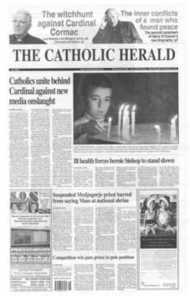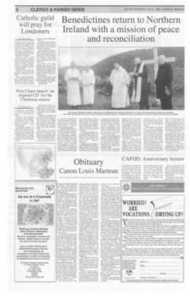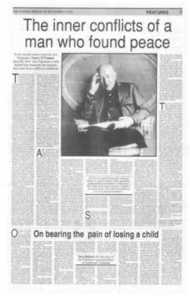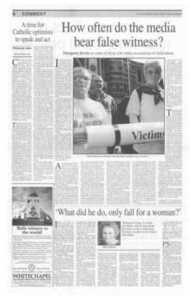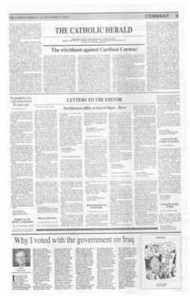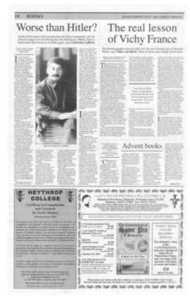Page 9, 29th November 2002
Page 9
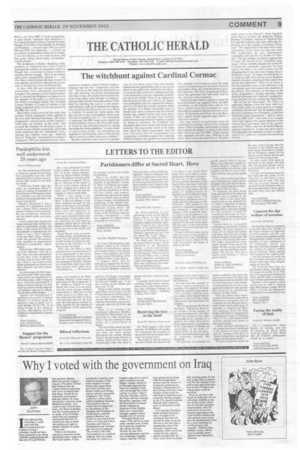
Report an error
Noticed an error on this page?If you've noticed an error in this article please click here to report it.
Tags
Share
Related articles
Cardinal Wins Apology For Fake Abuse Story
Police Abandon Investigation Of Negligence Case
Paedophilia, The Media And The Church
Happy 75th Birthday, Your Eminence
The Murdoch Witchhunt Zimbabwe: A Time To Speak
The witchhunt against Cardinal Cormac
WHEN, LAST WEEK, BBC 4's Today programme, at great length, launched what purported to be a detailed exposé of how Cardinal Cormac Murphy-O'Connor, when Bishop of Arundel and Brighton — not just once (the case of Fr Michael Hill) but repeatedly — covered up accusations of paedophile attacks by his clergy, it was not obvious, as we went to press, just how great a Press furore these "revelations" would unleash.
The shoddiness of Today's reporting of this plethora of supposed new cases (which presented the contents of anonymous letters as though they constituted serious evidence) seemed obvious enough. Most of the broadsheet press consequently ignored it — only The Times (which turned out later to have its own agenda) uncritically repeated the accusations as though they were established fact.
In fact, with the one exception already mentioned, every subsequent accusation brought to the attention of the Church authorities in Arundel and Brighton was passed on to the attention of the police or social services. The Tablet commented rightly that "Cardinal Cormac Murphy-O'Connor is entitled to feel deeply indignant at the way he was treated by the BBC this week".
But if these words were true last week, they become wholly inadequate when applied to the even more distorted reporting in the Today programme's second attack on the Cardinal a week later, on Tuesday of this week. This accused the Cardinal of allowing a priest to remain in post despite accusations, which the priest admitted, that he "interfered" with a teenage boy, eighteen years ago. Michelle Eliot of "Kidscape" demanded the Cardinal's resignation. This was repeated in every subse quent news bulletin, unlike Clifford Longley's response that this was "completely over the top". The fact is that what was presented as a new and shocking revelation demonstrated only that, h? fact, the Cardinal had reported the case to the police (who brought no charges), and had followed the Nolan procedures to the letter by referring the case to a risk assessment tribunal, made up of independent experts, who concluded that the priest was not a threat to children. It turned out, furthermore, that this was not a case of paedophile abuse at all (the boy in question was 17). The distinction is important: the BBC made great capital out of the Cardinal's letter to The Times last week, in which he had defended himself by saying that under the Nolan guidelines "in cases where no prosecution results, but allegations are regarded as well-founded, action would now be taken to remove a priest from active ministry".
But this would be in the context of a genuine
case of child abuse, since it has now become understood that paedophilia (that is, the sexual abuse of pre-pubescent children) is an obsessive and possibly incurable condition and that a true paedophile, however apparently penitent, can never be trusted. There is no suggestion that the priest in this case (who is, we repeat, not a paedophile) has ever repeated his offence; and it is clear that he is deeply penitent about the incident. It is hardly practicable that we should now start to demand that the Church should only employ priests who have never sinned. If this one emerged from scrutiny under the draconian Nolan procedures as being no threat to children, the Cardinal was absolutely right not to remove him from active ministry. One more point needs to be made here, about the Today programme: since he was convinced that the programme was conducting a witchhunt against the Cardinal, Clifford Longley only agreed to be interviewed if his remarks were broadcast uncut. He made a point of emphasising the distinction between paedophile abuse and what the priest in question had done. The Today programme dishonoured the agreement they had made, and cut this vital part of his argument.
There is no space here to analyse in detail the hysterical follow-up, triggered off by the BBC witchhunt, in the tabloid Press and in The Times, which on several occasions has since published accusations that have proved consistently ill founded (and which, as Lord Brennan's article on the opposite page shows, it refuses to correct).
But one article in particular must be mentioned in passing, since it is by a former editor of this newspaper. and because it vividly demonstrates the dangers of acting in the belief that what were once the BBC's high journalistic standards are still intact. Writing in the Daily Mail (which described him as "an influ ential voice in the Church"), Peter Stanford wrote that in Arundel and Brighton, Bishop Murphy O'Connor "moved Fr Michael Hill from parish to parish, each time inflicting this monster on a new group of trusting youngsters". The implication is that there were many such moves: in fact, there was only one; when Hill reoffended, he was immediately suspended, and sent for six months of "therapy". The big mistake was then to appoint him to what was classed as an "industrial chaplaincy". It was a terrible blunder (for which the Cardinal has repeatedly expressed his deep regret): but there is no solid evidence for the allegation that it was only one of many, that, in Stanford's words, "he knew of child abuse by as many as eight other priests in his Brighton diocese, but again redeployed them rather than inform the authorities". What we do know is that the authorities were in fact informed of all subsequent cases that came to the attention of the diocese. Nevertheless, on the basis of the Today programme's shoddy reporting, Peter Stanford demanded the Cardinal's resignation: to say the least, this has not been his finest hour.
But he has not been alone. The Times, in particular, emerges from this story with very little credit; truly, the gutter press is no longer confined to the tabloids. But the deepest shame, the most sickening loss of integrity, is that into which the Today programme — and by extension. the BBC itself —has sunk. It is a scandal which now requires the urgent attention of the Corporation's governors and of the government itself. This is, after all. the British Broadcasting Corporation; it must now prove that it still represents the standards we have a right to expect of a publicly funded broadcasting service.
blog comments powered by Disqus


